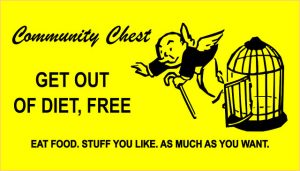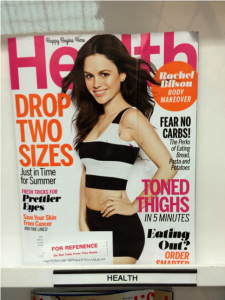
By Amber Ikeman, Intern 2014
I’m on a diet. I’ve been on it for a while and it’s actually pretty easy. No ridiculous amounts of money, none of those nasty chalk shakes, and no complicated tracking methods. It’s really healthy and I feel great. It’s called a food diet.
Sometimes while engaging in my food diet at lunch (which really just requires eating when I’m hungry), I hear my friends talking about other diets:
“I’m trying to be good. No French fries for me. No, not even one.”
“I can’t eat that. I’m on a high-protein, fat-free, no-carb, no-sugar, no-flavor diet. Lunch is for the weak.”
“I’m going to have to work out extra hard later after I eat this bite of chocolate!”
They sound really miserable. And it happens every day. One time, someone pointed out a plastic decoration on a cake and said, “This is the best part, because it doesn’t have any calories!” In defense of my food diet, I blurted out, “I LOVE CALORIES!” All I want is to enjoy company and a meal without every bite being scrutinized for what it might do, how we should punish ourselves for it later, or how heroic we are for denying ourselves something we may really want or even need (like carbs, for example). It certainly is not easy, though, especially considering how heavily we’re conditioned by a skewed idea of health.

We have learned to believe that the word “diet” indicates that a plan or product is healthy. With the goal of dieting being weight loss, the diet mentality also perpetuates the idea that being thin will make us healthy and thus able to live a long, joyful life. We see magazines whose titles claim that they’re about “health,” yet which are full of extreme dieting tips and unrealistically photoshopped bodies, promoting emphasis on appearance. They tell us that they hold the secret to our happiness. We hear people echo these messages: “You’re on a diet? Good for you! It’s great that you’re trying to be healthier.” When you’re dieting, you’re taking better care of yourself, and you can only be healthy if you’re slim, right?
The issue emerges when we accept standards as truth. Cultural norms such as “thin and healthy” become dangerous when we believe that we are only deserving or worthy of happiness if we meet them, especially when industries manipulate our beliefs solely to make money. When we confuse health with thinness and buy into diet-hype, we are giving the industry exactly what it wants and actually making happiness a lot harder to attain.
If we want to challenge deeply ingrained social misconceptions like this one, we have to be aware of where they come from. Advertisers know how to make us tick. They know that human beings are sensitive and easily manipulated by powerful messages. They take advantage of what they know will make us react, creating mass insecurities that have become cultural norms. It’s as if you’re an outsider if you’re happy with yourself, if you’re not body bashing or trying to lose weight. We’re praised for becoming smaller, and there’s often an uncomfortable taboo when weight is gained, even if that weight gain is completely harmless, even beneficial in some cases.
Fatphobia, created and perpetuated by the media, food, and diet industries, has conditioned us to believe that fat=bad and thin=good. It’s not just that fat is “ugly,” it’s that fat is unhealthy, which is not necessarily true, but if we hate on fat, we can somehow save the world from its unhealthy doom. The minimum requirement to be a plus-size model is size 6, which is smaller than the waist size of the average American woman over age 20. The modeling industry has created an arbitrary distinction between “normal” size and “larger-than-normal” size, even though the supposed larger size actually represents the majority of the population.
But smaller pants do not necessarily mean that the body inside them is healthy. The negative stigma about health and size can go both ways; the other day I heard someone say, “Ew, she’s so skinny and sickly.” There is a great deal of scientific evidence that proves that good healthcan be achievedindependent of size.You don’t hear about this stuff as much, of course, because it poses a threat to sales of weight loss supplements, “fitness” programs, et al. Health regardless of size and weight isn’t as popular, not as dramatic. And since the diet industry funds a great deal of research on obesity, no wonder there’s so much hype about fat.
So if being healthy doesn’t have to mean being skinny, what is health, anyway?
Eating is healthy, for example – it nourishes your body, keeps you alive, and causes pleasure sensors to go off in your brain. Dieting – regulating and restricting food to lose weight as it’s come to mean today – is not. With the mindset that eating makes people fat – also not necessarily true, as genetics play a role in determining body types – food also becomes an enemy.
The irony is that so many people invest their time, money, energy, and emotions in diets that they hope will change their lives and give them confidence (by being skinny), but dieting can actually be more harmfulthan living atyour body’s biological setpoint weight.Yo-yo dieting or weight cycling is linked to a slew of health problems like heart disease, diabetes, stroke, and suppressed immune function. These are clear indicators of ill health, whereas it’s impossible to tell someone’s health by their size.
There’s a whole market for “diet” foods, full of preservatives and processed ingredients that, in large amounts, are not good for the body. Take “diet” soda, for example. No calories? – Woohoo! – What could be bad? In fact, diet foods with artificial sweeteners slow metabolism and make you hungrier (so you can spend more money on their products). And those “protein bars” and shakes from diet plans like Weight Watchers and South Beach? What’s in that shit? According to the American Journal of Clinical Nutrition, diet drinks can be more unhealthy and harmful to the body than those that are sweetened with sugar. “I don’t care if I get cancer. At least I’ll be skinny.” (Those words actually ran through my head at one point in my life. And that’s exactly what the diet industry wanted me to think.) Processed and fast foods are often the cheapest, easiest, and most calorically dense options – a better “value meal” than say, a bunch of vegetables for the same cost. Processed food can raise the body’s setpoint and mess with the body’s hunger and fullness signals. As long as the cost of processed food remains low, the diet industry will capitalize on its effects – to huge financial gains. So why do we buy – literally and figuratively – diet propaganda?
The diet industry is a business. That business does not care about our actual health. They care about making money, and as long as we give that to them, they will keep feeding us whatever lies will keep us coming back for more.
Oh, they’re good. They tell us exactly what we want to hear and promise results that will get us lots of attention and acceptance. Because of this influence, when we do something “bad” or “wrong” like eating a sandwich with two pieces of bread instead of one, we feel like we have to justify it publicly before anyone else can embarrass us about it. “Everyone, just so you know, I’m eating just the insides of the sandwich because I’m trying to be healthy and cut carbs…”
What about doctors; aren’t they more credible? In reality, most doctors get very little nutrition training and often attempt to treat real health risks like high cholesterol and blood pressure – not a high number on the scale – by telling patients to lose weight. Yet there is evidence that fat may have nothing to do with those other issues. Doctors need to ask the right questions and take a holistic, personalized, unbiased approach to their patients’ health. Making fat a health issue feeds money into the diet, medical, and pharmaceutical industries, keeping us disempowered and unhappy.
Instead of trying to stuff, shrink, mutilate, and suffocate ourselves into an unrealistic mold that will never make us happy, why don’t we try to change the way the world views health? Health shouldn’t be about getting visual results (and validation from others of those results); it should be about having more energy, less pain, and better overall function. You can’t tell someone’s health by looking at them, so it’s time to dispel the black-and-white synonymy between health and thinness. When we are properly nourishing and taking care of our bodies, they align with the way that nature wants them to be, at different sizes and weights for each individual. Besides, who on this planet is totally, completely, one hundred percent healthy? What does that even look like? Health at Every Size, a movement that “supports people in adopting health habits for the sake of health and well-being (rather than weight control),” is a fantastic way to think about health with much more peace of mind. Not only is dieting physically dangerous, it also has some seriously negative psychological effects.
I want to live in a world where we ask ourselves “how is this choice going to make me feel?” instead of “how is this choice going to make me look?” Where if we decline a second piece of chocolate birthday cake, it’s because we’re listening to our bodies, not because we’re counting calories and viciously battling with our “willpower” – and where if we do eat it, we can still be good, healthy people! I speak from experience when I say that trying to feel good about yourself from the outside in is difficult, dangerous, and never satisfying. Why not spend that energy learning to love yourself as you already are? Why change yourself according to the manipulative whims of the money-sucking diet industry and the media? We can support each other in our effort to get rid of the diet industry’s power over us by keeping comments about food and exercise positive and, well, healthy. When we eat together, let’s celebrate it as a joyful gift of life and nourishment. If we choose to pursue health, may it be so that we may feel well and live happy, fulfilling lives.
One thought on “Health and Happiness: Why Dieting Won’t Bring You Either”